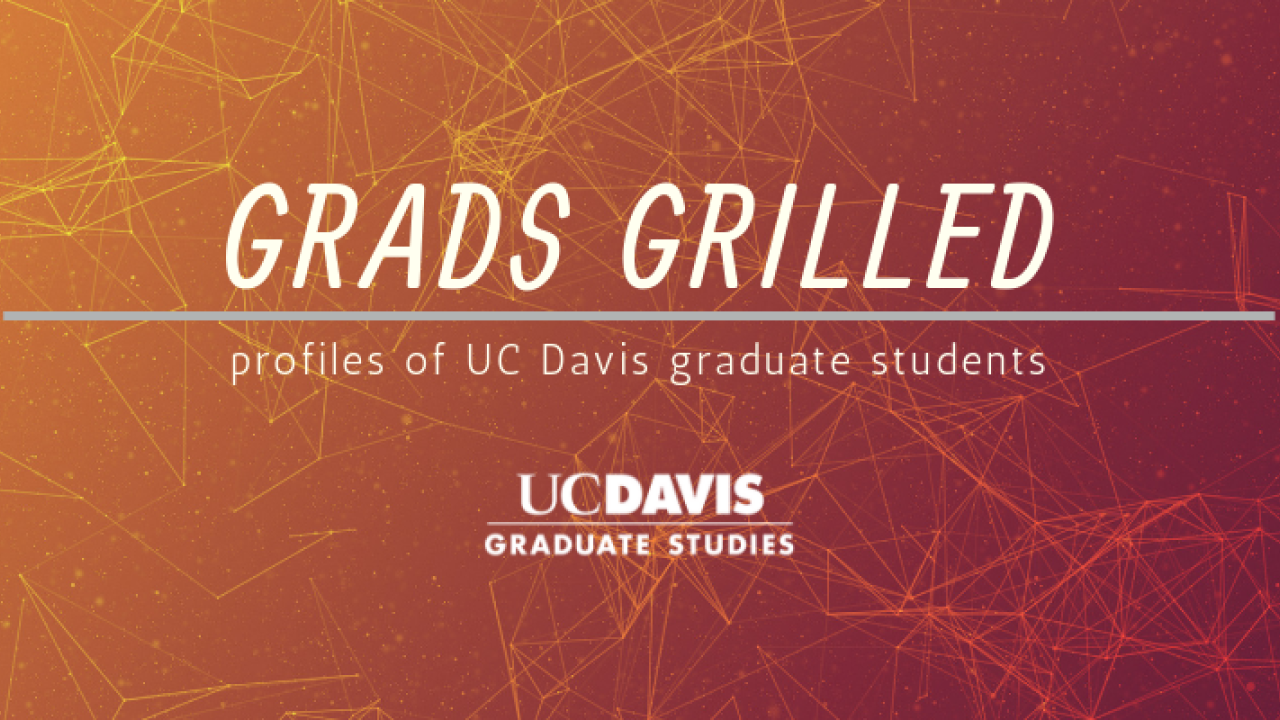
Graduate Student Profile: Abbey Berghaus, Sociology
Meet UC Davis Graduate Student Abbey Berghaus
- Department
Sociology
- Program and year of study
Ph.D., 2nd year
- Pronouns
She/Her/Hers
- Previous degrees and colleges
BA Sociology, University of Georgia
- Where did you grow up?
I actually lived in Davis until age 10. I then lived in Athens, Georgia before returning to Davis for grad school.
- Where do you live now?
In Davis—but not close enough to bike comfortably to campus, unfortunately.
- What's your favorite spot in Davis?
As a kid, I always really enjoyed the dancing ceramic pigs off of Covell. As an adult, I adore the rooftop of the John Natsoulas Gallery.
- How do you relax?
I take my dog on ridiculously long walks while listening to murder-related podcasts. Also, Netflix. So much Netflix.
- What was the last book you read for pleasure?
Little Fires Everywhere by Celeste Ng
- What TV show are you currently binge-watching?
Love with Gillian Jacobs and Paul Rust
- Research interests
My research focuses on the unique ways non-monosexual (bisexual, pansexual, queer, etc.) parents navigate their sexual identities and discuss sexuality with their children. I use a social constructivist lens to examine how heterosexism is learned through family socialization. My hope is to diversify the current family literature, which disproportionately represents White, cis-gender, monogamous, monosexual parents.
- Dissertation title or topic
The title is in the works. However, stay tuned for something along the lines of Parenting Beyond the Binary: How Bisexual and Pansexual Parents Discuss Sexuality with Their Children.
- Please share a surprising or noteworthy fact or finding from your research
Bisexual and pansexual people tend to define their attraction in similar ways. Of my 850+ survey participants, most use gender-neutral language when referring to the people they are attracted to. For example, rather than saying: “I am attracted to men and women” (which reaffirms the gender binary and excludes genderqueer folks), most tend to say something along the lines of: “I am attracted to my own and other genders”.
- Which professor or class inspired you to pursue graduate studies?
Patricia Richards at the University of Georgia. Rather than simply examining society as an artifact, she allowed space for students to criticize its oppressive forces. She taught me that research and teaching are both useful tools for furthering our activism.
- Which scholarly text do you wish you had written? Why?
Sara Ahmed’s Living a Feminist Life (2017). Namely, because Ahmed strategically chooses not to cite any white men in her book. Ahmed reminds us that citations are a powerful feminist tool. We’re so often taught to overlook the sexism of classic theorists and scholars in order to appreciate their overall contributions. Ahmed reminds us to uplift the thousands of marginalized scholars who contribute to their fields without reproducing sexist or racist ideas.
- What's the best thing about being a grad student?
Connecting with other grad students. No matter how stressed out I am about juggling TA responsibilities, research deadlines, and coursework, I know I can depend on my fellow grad students to uplift and encourage me. Also, the flexibility. Not many people can say they spend their weekdays reading feminist theory from the comfort of their own home.
- What's the worst?
Grad school is a breeding ground for poor mental health. Many of us are depressed. Many of us are anxious. And unfortunately, there really aren’t enough resources to help. Rather than glorifying the no-sleep, no-food, nothing-but-work lifestyle, we need to collectively uplift healthy practices. There’s nothing empowering about an 80-hour work week.
- If you weren't a grad student, what would you be doing?
Realistically, I would probably be a therapist or counselor. But there’s a slight possibility I would be writing angsty novels with queer protagonists.
- Finally, please ask yourself a question - "How can we improve conditions for graduate students?"
We need to change the institution to accommodate all graduate students, including POC, queer, disabled and differently-abled, low-income, trans and non-men graduate students. This means free tuition for all, a living wage, affordable housing, and protections against all forms of harassment. We need to support and encourage graduate students who prioritize their mental and physical health. We need to reject the mentality that graduate school is supposed to be miserable… that if you’re miserable, you’re doing it right. Grad students do a lot of shapeshifting to survive academia. We deserve to be met with similar accommodations by the institution.
Graduate student profile courtesy of the UC Davis College of Letters and Science.
About Graduate Studies
Graduate Studies at UC Davis includes over 100 dynamic degree programs and a diverse and interactive student body from around the world. Known for our state-of-the-art research facilities, productive laboratories and progressive spirit – UC Davis offers collaborative and interdisciplinary curricula through graduate groups and designated emphasis options, bringing students and faculty of different academic disciplines together to address real-world challenges.
UC Davis graduate students and postdoctoral scholars become leaders in their fields: researchers, teachers, politicians, mentors and entrepreneurs. They go on to guide, define and impact change within our global community.
For information on Graduate Studies’ current strategic initiatives, visit the Graduate Studies strategic plan page.
